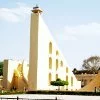Best tourist attractions in Jaipur
kjohri | Jun 09, 2012 | Comments 0
Jaipur, the capital city of the Indian state of Rajasthan, is a very popular tourist destination. Jaipur was founded on November 18, 1727 by Maharaja Sawai Jai Singh II. Jaipur is known as the pink city because it was painted in pink color in 1876 to welcome Prince Albert Edward, the Prince of Wales and, since then, pink is the favorite color of streets and buildings. Jaipur is a well planned city with many places to see for the tourists. The historical monuments, museums, parks and landscapes make the top tourist spots. Jaipur, along with Delhi and Agra, makes India's Golden Triangle tourist circuit.
The best tourist attarctions in Jaipur are as follows.
Jantar Mantar
Jantar Mantar at Jaipur is an observatory with architectural instruments for astronomical measurements and observations. Jantar Mantar was built by Maharaja Sawai Jai Singh II, who became the ruler of Amber in 1699. Maharaja Sawai Jai Singh II founded the city of Jaipur in 1727 and built five Jantar Mantar’s in the cities of Delhi, Jaipur, Mathura, Varanasi and Ujjain during the years, 1724-1735. Of these, Jantar Mantar at Jaipur is the biggest and best preserved. Jantar Mantar at Jaipur is a UNESCO World Heritage Site.
City Palace
City Palace is actually a complex of palaces and was the official residence of the Maharaja of Jaipur. The palaces provide a beautiful synthesis of Rajput, Mughal and European styles of architecture. The palace complex has beautiful gardens, courtyards and buildings. It was built during the years 1729 – 1732. City Palace is a top tourist destination.
Hawa Mahal
Hawa Mahal is the Palace of the Winds, or the Palace of the Breeze. It was built in the year 1799 by Maharaja Sawai Pratap Singh (1778-1803). The most striking view of the monument is the rear wall, viewed from outside. Here, one can see 953 small windows, called jharokhas, spread over the massive pink wall. Hawa Mahal has two courtyards, leading to a rather thin building of five stories.
Man Sagar Lake and Jal Mahal
Man Sagar Lake is an artificial lake, built as a dam to store water for the city’s population about 400 years ago. The lake covers an area of 300 acres and has a maximum depth of about 3.5 meters. It is surrounded by Nahargarh Hills. Important palaces like Amber Fort, Jaigarh Fort and Nahargarh Fort are situated close to the Man Sagar Lake. Jal Mahal is the Water Palace, situated in the middle of the lake. Jal Mahal was built by Maharaja Sawai Pratap Singh, the ruler of Jaipur during 1778-1803.
Amber Fort
Amber Fort is a sixteenth century fort located in the hilly town of Amer, about 11 kilometers from Jaipur. It was built by Raja Man Singh, the Kacchwaha King of Amber and a celebrated Navratna in the court of Mughal emperor Akbar, in 1592. Amber Fort is a popular for splendid architecture and beautiful art designs at gateways and palaces inside the fort. Diwan-I-Khas, the Hall of Private Audiences inside, is decorated with fine glass work, and for this reason, it is also called Sheesh Mahal, or the Glass Palace.
Jaigarh Fort
Jaigarh Fort is situated on top of the hill named, Cheel Ka Teela (Hill of Eagles). It was built between the 15th and 18th centuries. The fort has a cannon foundry and a big cannon, named Jaivana, was built here and is displayed here. Jaigarh Fort has got beautiful palaces. Since it is at a good height, it offers amazing views of the surrounding Aravalli Hills and the nearby Amber Fort.
Nahargarh Fort
Nahargarh Fort was built in 1734 by Maharaja Sawai Jai Singh II, the founder of the city of Jaipur. The fort was extended during the reign of Maharaja Sawai Ram Singh II (1835-1880) and the reign of Maharaja Sawai Madho Singh II (1880-1922). The fort has a big palace, Madhavendra Bhawan, having nine identical suites inside. Like other forts, Nahargarh Fort is also at a good height, being situated on top of Aravalli Hills, and offers a bird’s eye view of the city of Jaipur.
Albert Hall
Albert Hall is a historical building located in the Ram Niwas Garden in the heart of the city. The foundation stone for Albert Hall was laid during the visit of Prince Albert Edward to the city as the Prince of Wales on February 6, 1876. Albert Hall was built in 1876-87 during the reign of Maharaja Sawai Madho Singh II. It was designed by the English architect Sir Samuel Swinton Jacob in the Indo-Saracenic architectural style. Albert Hall houses the Central Museum.
Central Museum
The Central Museum started in temporary rooms in Jaipur in August 1881. It came up under the guidance of Colonel Thomas Holbein Hendley, a British medical officer who took great interest in Indian art. It was transferred to the Albert Hall in September 1886 and was formally opened in February 1887. The Central Museum has beautiful pieces of art and craft under the sections, Arms and Armour, Sculpture Gallery, International Art, Pottery Collection and Musical Instruments.
Filed Under: Travel
Comments (0)
Trackback URL
